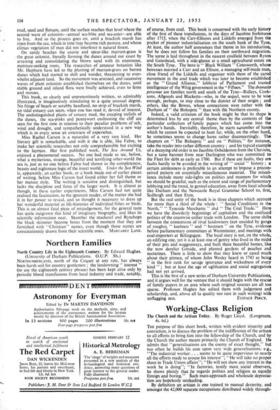Northern Families
North Country Life in the Eighteenth Century. By Edward Hughes. (University of Durham Publications. O.U.P. 30s.)
NORTHUMBERLAND, north of the Coquet at any rate, has always been harsh soil for country gentlemen ; the landowning" interest" (to use the eighteenth century phrase) has been kept alive only by periodic blood transfusions from local industry and trade, notably, of course, from coal. This book is concerned with the early history of the first of these transfusions, in the days of Jacobite forfeitures after 1715, when the Carr-Ellisons and Liddells emerged from tile pocket of pioneer industrialisation on the south bank of the Tyne. At least, the author half announces that theme in his introduction, but he does not follow his families on their northward migration. The scene is laid throughout in the nascent coalfield between Ryton and Gateshead, with a side-glance at a small agricultural estate on the South Tyne. The hero is" Black William " Cotesworth, whose heiresses married a Carr and an Ellison, a managing self-made man, close friend of the Liddells and organiser with them of the cartel movement in the coal trade which was later to become established as the "Grand Alliance," lobbyist of Parliament and trusted intelligencer of the Whig government in the "Fifteen." The dramatis personae are families north and south of the Tyne—Ridleys, Cook- sons, Allgoods and Blacketts—who, in the sequel, were to be wise enough, perhaps, to stay close to the district of their origin ; and others, like the Bowes, whose connections were rather with the Durham of" the Bishopric " than with die Northern county. Indeed, a valid criticism of the book might be that its shape is determined less by any central theme than by the contents of the particular collection of family papers which has come into the author's hands. Inevitably, therefore, he starts asnumber of hares which he cannot be expected to hunt far, while, on the other hand, he sometimes seems to change hares rather disconcertingly. The chapters on "The Bishopric" and on " Politics," for instance, take the reader into rather different country ; and his typical example of a decaying old order is no Jacobite Osbaldeston from the Cheviots, but a tame baronet from near Darlington who was committed to the Fleet for debt as early as 1700. But if these are faults, they are faults hardly to be avoided in the writing of " social" history ; a certain aimlessness is preferable to an attempt to impose a precon- ceived pattern on essentially miscellaneous material. The miscel- lanea include many side-lights on politics and manners for which we should be grateful, such as the extent and range of parliamentary lobbying and the trend, in genteel education, away from local schools like Durham and the Newcastle Royal Grammar School to, first, Sedbergh and then Eton.
But the teal unity of the book is in three chapters which account for more than a third of the whole : " Social Conditions in the North," "Tyneside Merchants" atd "The Coal Trade." Here we have the disorderly beginnings of capitalism and the confused politics of the coastwise collier trade with London. The scene shifts between the contentions of rival landowners (not unaided by gangs of roughs), " keelmen " and " hostmen " on the Tyne, evidence before parliamentary committees at Westminster, and meetings with coal-importers at Billingsgate. The local story is not, on the whole, an edifying one, yet it is at least one of gentry who lived in the midst of their pits and waggonways, and built there beautiful homes, like the now derelict Gibside, and planted gardens of peaches and nectarines. There is little to show that they knew or cared much about their pitmen, of whom John Wesley heard in 1743 as being "in the first rank for savage ignorance and wickedness of every kind " ; but at least the age of uglification and social segregation had not yet arrived. This is the first of a new series of Durham University Publications, and it argues well for the venture that it should begin with the rescue of family papers in an area where such original sources are all too sparse. Professor Hughes has edited them with judgement and scholarship, and, above all (a quality too rare in such writing) with


































 Previous page
Previous page